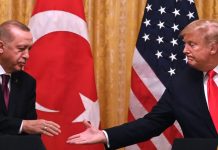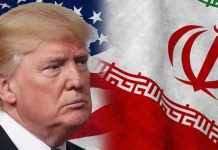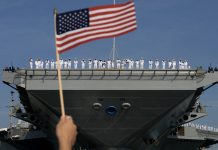The US is looking to create an ‘Arab NATO’ alliance to counter Iran. This so-called ‘Arab NATO’ as planned by the US will include Saudi Arabia, United Arab Emirates, Oman, Bahrain, Kuwait, Qatar, Egypt and Jordan. But can foes Saudi Arabia and Qatar work together for a joint military project? Why does Iran think that Arab NATO is doomed to fail?
- Can ARAB NATO – The Middle East Strategic Alliance (MESA) Counter Iran?
- After Crimea, Is Russian Vladimir Putin Eyeing Other Parts of Ukraine?
The deliberations on this new military alliance in the Middle East had resumed as soon as Trump assumed office. Initially, it was largely speculated that even Israel will be a part of this alliance, but Israel’s direct involvement is doubtful now.
Israel’s relations with Arab nations took a setback when the US decided to shift the US Embassy in Tel Aviv to Jerusalem. But Iran thinks Israel will pay a vital role in Arab NATO alliance, by providing vital intelligence on Iran.
The US will hold a summit with future alliances in October and look to have a larger control over the Middle East through this Arab NATO which is among the top priorities of Washington. Experts pointed out that most of the Arab nations do not have a mutual security policy. There is no common enemy in the Middle East but the US has been trying to put Iran in a bad light and if at all this Arab NATO comes to being then this alliance will be used by the US against Iran’s interests.
- Is JF-17 Thunder Fighter Jet a Better Choice than HAL Tejas?
- Russian SU-57 or American F-35: Who is Winning the Fighter Jet Market?
The Arab nations have invested largely in the US economy to avoid being under the influence of the US for its decisions. Will Qatar still stand by Iran’s side even if it is just about annoying Saudi Arabia? Qatar has been loggerheads with Saudi and its allies on different issues and Saudi has tried to isolate Qatar in all forms.
Why is Arab NATO Doomed to Fail?
According to Iranian Media, Arab NATO has been directed at confronting what they call the increasing Iranian sway in the region. Observers say the entire project is doomed to fail due to various reasons. Darko Lazar, a Lebanese political analyst stated that similar schemes by preceding US governments to promote a military alliance with kingships of Arab allies have failed in the past.
“The Arab NATO is a US and Saudi scheme with precisely defined roles: Riyadh funds, Washington supplies the arms, Cairo provides the bulk of the manpower, and the ‘Israelis’ contribute in the field of intelligence,” the analyst said.
- Chengdu J20 – Russian Design, Stolen Technology from F-35?
- Russian, 5th Generation, PAK FA Jet, Not Worth the Cost without Technology
Some strategic differences between Arab monarchies have led most analysts to conclude that uniting Arab militaries under one umbrella remains unlikely. Such an expectation severely endangers Washington’s efforts with the Saudis at the helm. The Saudis cannot operate independently. Their brand-new military jets are piloted by Pakistani and Egyptian pilots, while other foreign nationals are already dying in droves to defend the kingdom’s southern border.
Perhaps the greatest hurdle to the development of an Arab NATO is the widening cracks within the seemingly monolithic Gulf Cooperation Council (GCC). In late May, Saudi Arabia, the UAE and Bahrain blocked websites relating to fellow GCC member Qatar, including Al-Jazeera over allegations posted on a state-run news agency. Doha instantly declared its official websites were hacked after statements critical of Trump and praising the Iranian regime.
Qatar has own geopolitical ambitions, which are barely compatible with those of Saudi Arabia. Experts said Qatar retained a foreign policy partially independent of Saudi Arabia. Meanwhile, Saudi Arabia’s war on Yemen is facing its own set of hurdles. Besides the military failures, the Saudis and the Emiratis have distinctive views on the way forward.
All in all, even if the Arab monarchs of the GCC can accept on an efficient strategy, the move is observed more as a tactic by the US to only tempt Riyadh and Abu Dhabi into purchasing more weapons, without any results.
More News at EurAsian Times
- Indian Military Base in Sabang can Strangle China at the Strait of Malacca
- Major Spat Between India and Pakistan Over Free Balochistan Office In Delhi
- Saudi Arabia Halts All Oil Shipments After Yemen Missile Attack
- Saudi Crown Prince Unravels Deep Secrets Behind Wahhabism and the Yemen War




